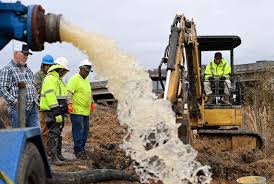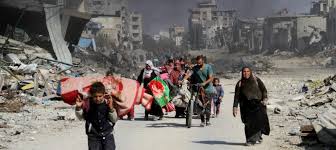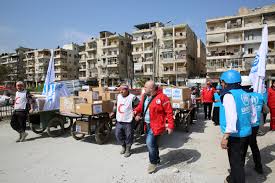1. Jacobabad: A City Battling Extreme Heat and Water Shortages
Jacobabad, located in Sindh province, is infamous for its sweltering temperatures, often exceeding 50°C (122°F) during peak summer months. Climate experts rank it among the world’s hottest inhabited places, where residents endure life-threatening heatwaves every year.
Water scarcity has long plagued the city, with limited access to clean drinking water. Groundwater sources are heavily contaminated, and outdated infrastructure makes it difficult for locals to secure safe water. Many rely on government-funded filtration plants and foreign aid projects for daily survival.
As temperatures rise and rainfall remains scarce, Jacobabad’s dependence on sustainable water initiatives becomes even more critical. However, recent shifts in U.S. foreign policy threaten to undermine these essential programs.

2. The U.S. Aid Cut and Its Impact on Water Infrastructure
During his presidency, Donald Trump reduced U.S. foreign aid to several developing countries, including Pakistan. These cuts affected critical infrastructure projects, particularly those funded through USAID (United States Agency for International Development).
One of the most affected initiatives is Jacobabad’s water supply program, which relied heavily on foreign funding to:
💧 Build new water filtration plants to provide safe drinking water
💧 Upgrade old pipelines to prevent contamination and water loss
💧 Improve irrigation systems for local farmers
With aid being scaled back or withdrawn, these projects have stalled, leaving thousands of vulnerable families struggling to access clean water. This decision has worsened an already fragile situation, forcing local authorities to seek alternative funding sources.

3. The Humanitarian Crisis: Residents Struggle for Survival
The impact on Jacobabad’s residents has been devastating. The combination of extreme heat and dwindling water supply has led to a public health emergency.
🚨 Major Consequences of the Water Crisis:
- Increase in heatstroke cases due to dehydration
- Severe waterborne diseases such as cholera and dysentery
- Economic strain on families forced to buy expensive bottled water
- Mass migration as residents flee to cooler regions
Local hospitals report a surge in medical emergencies, with doctors warning that without immediate intervention, heat-related deaths will continue to rise. Women and children, who often walk miles to fetch water, face the greatest risk of exhaustion and illness.

4. Government and NGO Efforts to Address the Crisis
In response to the worsening crisis, Pakistan’s federal and provincial governments, along with non-governmental organizations (NGOs), have stepped in to mitigate the damage.
✅ Sindh Government’s Emergency Measures:
- Deployment of water tankers to the most affected areas
- Plans to establish temporary cooling shelters
- Requesting alternative funding from China and the European Union
✅ NGOs and International Relief Efforts:
- UNICEF and WHO are assisting with clean water distribution
- Local charities are funding small-scale solar-powered filtration plants
- Crowdfunding campaigns have emerged to support affected families
Despite these efforts, long-term solutions are still needed to ensure Jacobabad’s water security in the face of climate change and political challenges.

5. Possible Solutions and the Path Forward
While the U.S. aid cut has undoubtedly impacted Jacobabad, alternative solutions can help prevent a full-blown catastrophe.
🌍 Potential Strategies to Secure Water Access:
- Diversify International Funding – Seek assistance from China, the EU, and Gulf nations to replace lost U.S. funding.
- Invest in Solar-Powered Water Plants – Use renewable energy to power desalination and filtration units.
- Enhance Local Infrastructure – Repair and upgrade existing water pipelines to reduce waste.
- Encourage Rainwater Harvesting – Implement urban collection systems to store rainwater for later use.
- Strengthen Climate Policies – Push for long-term water conservation and climate adaptation plans.
Experts emphasize that Jacobabad’s survival depends on urgent intervention. Without sustainable solutions, the city’s residents will continue to suffer, facing a grim future of unrelenting heat and water deprivation.



You must be logged in to post a comment.